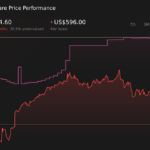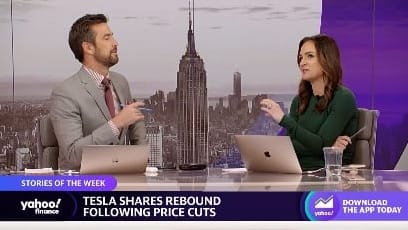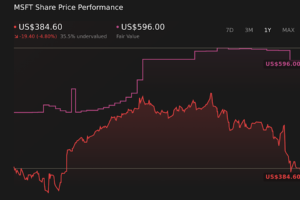Yahoo Finance Live anchors discuss the top stories of the week affecting stocks such as Google, Tesla, Netflix, among others.
Video Transcript
SEANA SMITH: All right, we want to dive a little bit deeper on some of the biggest stories, the biggest stock stories of the week also today. And let’s start with Netflix. We’re looking at gains of just about 8 and 1/2%, the move higher coming after the company reported quarterly subscriber growth nearly double what the Street had been expecting. Netflix’s positive number there outshining the streaming giant shakeup in the C-suite. Co-founder Reed Hastings stepping away from his co-CEO role. It is important to point out, though, he is staying on as chairman, so he’s not totally stepping aside here when it comes to Netflix.
But Dave, taking a look at the reaction in the stock today, that subscriber number much bigger than I was anticipating, shares hitting the highest level that we’ve seen since April. The stock has now more than doubled from the low back in May. Safe to say that its new ad tier seems to be working. And then, of course, that strong slate of content is paying off for now.
DAVE BRIGGS: Yeah, literally every hit that you see in the streaming space has been Netflix this year, with the exception of, really, “Yellowstone.” And that’s more of a traditional legacy media. But you look at “Glass Onion” has been huge, and “Wednesday’s” been massive.
And they just continue to roll them out, but I was really surprised by the reaction to Reed Hastings because just about every analyst said one of the best CEOs in this country today, and yet they applauded the transition and how they handled it and seem to be very optimistic about them not falling off one bit. So you thought with the applauds would be some more fears that Netflix might lose their way, but that was not the case.
SEANA SMITH: No, it doesn’t certainly seem to be the case. JPMorgan was out with a note saying that Reed’s exit, it does mark the end of an era clearly, but they’re expecting a smooth transition. And Hastings saying in that blog post that they have been preparing for this. He’s been preparing for it with the board for years. So it seems at least for right now, Wall Street is pretty confident in the direction of the company.
This is totally different reaction than what we’ve seen to Netflix’s earnings recently. Evercore was out with the note saying that the new ad tier, the crackdown on password sharing, that those are major catalysts here. And they’re very confident that’s going to drive a material reacceleration in revenue and EPS growth, something that the Street has been waiting for when it comes to Netflix.
DAVE BRIGGS: Really curious to ask a guest coming up here, the author of “Binge Times,” what it is about Netflix that might teach other companies in this space that co-CEOS work because they are staying in that co-CEO lane. I do want to mention other streamers seem to gain off of Netflix as well. Warner Brothers Discovery up more than 4% and up 36% this year. Disney is up more than 4% and up 16% this year. And lastly, Paramount is up 4% today as well, all three of them, and up 19% this year. So, yes, they were all beaten down names last year, but a lot of optimism in the streaming space right now.
Not so much the case in tech, of course. Tech layoffs this week causing varying reaction to stocks. Microsoft laid off 10,000 workers and saw shares tumble roughly 3%. Meanwhile, Google’s layoffs appear to have had the opposite impact with the shares climbing today. And why that’s, I think, really notable is that they’re both making layoffs for exactly the same reason. They overhired during the pandemic, which demand was skyrocketing. And now they’re simply cutting back because it’s a different economy moving forward. Why do you think the stocks reacted so differently?
SEANA SMITH: I think in Microsoft’s regard, I think it was expected from the Street. Maybe that’s why we didn’t really see the reaction. A lot of that had already been priced in. But I think Google’s cuts really did surprise the Street. When you take a look at the gains that we saw today, significant move to the upside.
And when you take a look at some of the analyst commentary that we have gotten out so far, Morgan Stanley was out saying that they do expect the job cuts to save between 3 and 5 billion. They called them a welcome surprise. They say it speaks to Google’s ability to really make difficult decisions on how to better manage cash flow.
So I think analysts, many analysts weren’t necessarily expecting Google to have to come out and slash 12,000 jobs. So I think that’s why we’re seeing such a bounce up in the stock today, given the cost cuts that the company will get from this.
DAVE BRIGGS: Big picture, some wondering if this is a positive Fed story in terms of moving the unemployment rate up. We are still at a 50-year low of 3 and 1/2. And you’ve got to consider, although these get a lot of headlines, these big tech firms, such a small slice of our employment. You’re talking about 10% of the economy in terms of what they make up, but not in terms of the share of the employment in the United States, only about 2%. So really a small slice. Not going to move the needle in terms of what Jerome Powell wants and needs to see. That’s the heartless side of the story.
SEANA SMITH: Yeah, certainly important to bring up, though. We also want to talk about some of the big banks because Goldman Sachs, Morgan Stanley both reported on Tuesday. Goldman reporting profits were down nearly 70% on a yearly basis in its most recent quarter. Shares, though, down another 2 and 1/2% today, falling on the news on a Journal report that the Federal Reserve is investigating Goldman’s consumer lending business.
Of course, this adds to some of the woes facing Goldman right now. I mentioned that 70% drop in profit. Goldman also cutting over 3,000 jobs earlier this month. We know many of that– many of those jobs coming from its trading and investment banking division, something that Goldman is going to be relying on more so going forward when you take into account it’s moving away from that consumer side of its business. But certainly this probe here from the Federal Reserve, what the Journal is reporting, another challenge facing the bank, Dave.
DAVE BRIGGS: Yeah, and that consumer facing the markets, as it’s called, really has been the rough, rough go, repeatedly struggling in that area. It’ll be– a sports reference here– interesting how they make half-time adjustments because now they’re going to have to react to what others around them have done. They have led for so long. Now we’re going to have to see, with deal-making continually flat lining, how do they adjust to what others are doing, the only one of the big banks to make layoffs. David Solomon said trying to do too much too quickly. Again, that was their largest quarterly miss in more than a decade.
On the other hand, Morgan Stanley rising after exceeding earnings expectations this week. The company’s wealth management business posted record net revenue of $6.3 billion. That was the difference maker. Wealth Management, they pivoted. They perhaps saw the lack of M&A, the lack of dealmaking ahead, made a move, and it paid off big-time. How will Goldman Sachs follow and react?
SEANA SMITH: Yeah, certainly UBS have called their results, fourth quarter results encouraging. And also what struck me from Morgan Stanley, comparing it to what we’ve heard from the other banks, was the comments from CEO James Gorman. He was pretty upbeat just in terms of saying that he is very positive with the outlook of Morgan Stanley right now, saying that a Fed pause will boost dealmaking and underwriting activity, really seeing maybe a green light here at the end of this tunnel, some light at the end of the tunnel.
But Morgan Stanley clearly the outperformers, especially when you put it up against Goldman Sachs in terms of the numbers that they reported. But like you were saying, almost all that had to do with the wealth management arm.
DAVE BRIGGS: All right, and rounding things out with Tesla, seeing positive action this week to its vehicle price cuts after the stock initially dropped on the news last Friday. Wall Street analyst out this week, highlighting that while the move may hurt margins, Teslas are now more affordable and the company should see increased demand moving forward. Piper Sandler writing in a note to clients earlier this week, Tesla can now, quote, “easily achieve at least 50% delivery growth in 2023.”
Now these very same analysts were very critical of the move initially because of the impact on margins and now they’ve really kind of flipped to applaud the move because it opens up a whole new audience to Teslas that can now afford the car. It’ll be interesting to see– we won’t get a look at it in next week’s earnings because this is really a Q1 next quarter story. It will be really interesting to see how much those margins are trimmed.
SEANA SMITH: Yeah, exactly. And I think that’s a key issue here because, yes, they are more optimistic in terms of demand, in terms of Tesla being able to reach some of those delivery targets, but the pressure it’s going to have on margins, I think that’s still a huge question out there. When you take a look at some of the analyst action, we have seen a number of the price targets lowered on Tesla, at least for right now, with Citi lowering their price target to 137 from 140. Piper Sandler, even though they were optimistic about those deliveries, they did mention the margin pressure here, at least in the short-term.
And the average price target on the Street now is just around 192, so substantially higher from where we are today. But that’s off more than 30% from the average price target just in November. So really putting that in perspective. And I think analysts still have some questions about that margin pressure and also what demand, even with the price cuts, might look like if we do get a deeper recession than maybe many are expecting.
DAVE BRIGGS: Yeah. As for the price cuts in China, which preceded ours initially, we thought really adverse reaction, a lot of protests to Tesla factories from people that just bought a Tesla. Dan Ives and Wedbush, though, took a survey, and in China, found nearly 70% responded these recent price cuts have positively influenced their decision to more likely purchase a Tesla Model Y. So it looks like a win in China.










